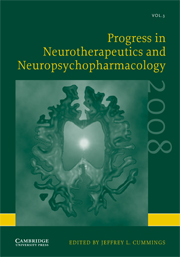Book contents
- Frontmatter
- Contents
- Contributors
- Progress in Neurotherapeutics and Neuropsychopharmacology 2008
- Triflusal versus Aspirin for the Prevention of Stroke
- The Argatroban and tPA Stroke Study
- Use of Selegiline as Monotherapy and in Combination with Levodopa in the Management of Parkinson's Disease: Perspectives from the MONOCOMB Study
- Ropinirole 24-h Prolonged Release in Advanced Parkinson Disease: Review of a Randomized, Double-Blind, Placebo-Controlled Study (EASE PD-Adjunct Study)
- Insulin Resistance Alzheimer's Disease: Pathophysiology and Treatment
- Targeting Amyloid with Tramiprosate in Patients with Mild-to-Moderate Alzheimer Disease
- Intranasal Zolmitriptan Is Effective and Well Tolerated in Acute Cluster Headache: A Randomized Placebo-Controlled Double-Blind Crossover Study
- Optimal Dosing of Immunomodulating Drugs: A Dose-Comparison Study of GA in RRMS
- Tetrathiomolybdate versus Trientine in the Initial Treatment of Neurologic Wilson's Disease
- Randomized Clinical Trials of Pregabalin for Neuropathic Pain: Methods, Results, and Implications
- Effect of Methylphenidate in Patients with Acute Traumatic Brain Injury; a Randomized Clinical Trial
- Improvement in Speeded Cognitive Processing After Anti-epileptic Drug Withdrawal–A Controlled Study in Mono-therapy Patients
- A Randomized-Controlled Trial of Bilateral rTMS for Treatment-Resistant Depression
- Serotonin Related Genes Affect Antidepressant Treatment in Obsessive–Compulsive Disorder
- Night Eating Syndrome and Results from the First Placebo-Controlled Trial of Treatment, with the SSRI Medication, Sertraline: Implications for Clinical Practice
- Modafinil: A Candidate for Pharmacotherapy of Negative Symptoms in Schizophrenia
- New Approaches to Treatment of Schizophrenia by Enhancing N-methyl-D-aspartate Neurotransmission
- Subject Index
- Author Index
Effect of Methylphenidate in Patients with Acute Traumatic Brain Injury; a Randomized Clinical Trial
Published online by Cambridge University Press: 13 May 2010
- Frontmatter
- Contents
- Contributors
- Progress in Neurotherapeutics and Neuropsychopharmacology 2008
- Triflusal versus Aspirin for the Prevention of Stroke
- The Argatroban and tPA Stroke Study
- Use of Selegiline as Monotherapy and in Combination with Levodopa in the Management of Parkinson's Disease: Perspectives from the MONOCOMB Study
- Ropinirole 24-h Prolonged Release in Advanced Parkinson Disease: Review of a Randomized, Double-Blind, Placebo-Controlled Study (EASE PD-Adjunct Study)
- Insulin Resistance Alzheimer's Disease: Pathophysiology and Treatment
- Targeting Amyloid with Tramiprosate in Patients with Mild-to-Moderate Alzheimer Disease
- Intranasal Zolmitriptan Is Effective and Well Tolerated in Acute Cluster Headache: A Randomized Placebo-Controlled Double-Blind Crossover Study
- Optimal Dosing of Immunomodulating Drugs: A Dose-Comparison Study of GA in RRMS
- Tetrathiomolybdate versus Trientine in the Initial Treatment of Neurologic Wilson's Disease
- Randomized Clinical Trials of Pregabalin for Neuropathic Pain: Methods, Results, and Implications
- Effect of Methylphenidate in Patients with Acute Traumatic Brain Injury; a Randomized Clinical Trial
- Improvement in Speeded Cognitive Processing After Anti-epileptic Drug Withdrawal–A Controlled Study in Mono-therapy Patients
- A Randomized-Controlled Trial of Bilateral rTMS for Treatment-Resistant Depression
- Serotonin Related Genes Affect Antidepressant Treatment in Obsessive–Compulsive Disorder
- Night Eating Syndrome and Results from the First Placebo-Controlled Trial of Treatment, with the SSRI Medication, Sertraline: Implications for Clinical Practice
- Modafinil: A Candidate for Pharmacotherapy of Negative Symptoms in Schizophrenia
- New Approaches to Treatment of Schizophrenia by Enhancing N-methyl-D-aspartate Neurotransmission
- Subject Index
- Author Index
Summary
ABSTRACT
Background: Traumatic brain injury (TBI) is one of the major causes of death and disability among young people. Methylphenidate is a neural stimulant with possible brain protection properties and has been mainly used in clinic for childhood attention deficit/hyperactivity disorder. TBI patients with late psychosocial problems could benefit from methylphenidate because of the effect on arousal and consciousness level in the sub-acute phase. We studied this effect during the acute phase of moderate and severe TBI. Design and Methods: Forty patients with severe TBI (GCS = 5–8) and 40 moderate TBI patients (GCS = 9–12) were randomly divided into treatment and placebo groups on the day of admission. Treatment group received methylphenidate 0.3 mg/kg two times a day orally, beginning on the second day of admission and continuing until being discharged. Admission information and daily Glasgow Coma Scale (GCS) were recorded. Medical, surgical, and discharge plans for patients were decided by attending physicians, who were kept blinded during the course of treatment. Results: In the severe TBI patients, both hospital and ICU length of stay, on average, were shorter in the treatment group compared with the control group. In the moderate TBI patients, ICU stay was shorter in the treatment group, there was no significant reduction of the period of hospitalization. Interpretation: There were no significant differences between the treatment and control groups in terms of age, sex, post-resuscitation GCS, or brain scan findings, in either severely or moderately impaired TBI patients.
- Type
- Chapter
- Information
- Progress in Neurotherapeutics and Neuropsychopharmacology , pp. 189 - 198Publisher: Cambridge University PressPrint publication year: 2008

